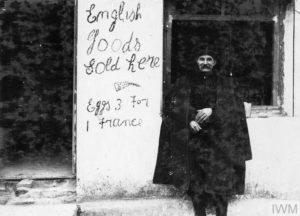Monday July 29th, 1918
Light duty. Flu breaks out in the Battalion. Very nice day – lovely. First night out into French village and had milk etc.
Leaving Camp
Today Frank gets to leave the camp and visit a French village. He has been confined to barracks for the past 14 days for stealing and eating a can of Bully Beef. It must feel like freedom at last.
After months in Salonika where there was little to see or do, to end up confined to camp just after arriving in France must have felt like a real prison sentence. That said, Frank, as a teetotaler and Salvationist, seems not to be tempted by any local wine. Instead he enjoys a glass of milk.
Flu has broken out in camp.
A Break from Routine
It is well documented that most of the time the troops were regularly rotating in and out of the front line trenches. As a result many soldiers spent a lot of time at the rear. However, this did not equate to ‘time off’. You only need to look at any of the BWD entries for the 13th Manchesters to see that the soldiers were kept busy. As such, when away from the fighting, they worked as labourers, were honing their military skills or participating in organized sports.
An analysis of the activities of the 1st Australian Division by Robert Stevenson shows this clearly.
‘From a total of 1,683 days, the 1st Division spent just over half of those in operations which included support, and offensive and defensive operations against the German Army. The remaining days were equally divided between training and administration. The 374 days spent training included individual, collective, and combined training, while the other 423 were spent doing administration, moving between camps, and logistics. Of the 1,683 days spent on active service in the First World War, troops spent just 153 actually resting, relaxing, and enjoying the freedom of their own downtime.’¹

Therefore a few hours away from camp could make a big difference to the men. ‘… [away from] the boredom and tedium of training and fatigue parties, life behind the lines brought soldiers into contact with civilians, and with the simple pleasures in life. One of the most greatly appreciated aspects of rest was the estaminets – shabby French cafés that served wine, beer, eggs, and chips.’
This opportunity even presented itself in Salonika, albeit more rarely because of the distance between the town and the front line. This photograph shows an enterprising patron outside his shop.
13th (Service) Battalion War Diary – 29th July 1918 – Haudricourt, France
D Coy working on Assault Course C2 training area. Other Companies specialist training and work on Bombardment slits. Major RML Scott MC, 2nd in command, returned off leave. Lt G Robertson (Transport Officer) left on leave with 3 OR. Programme of Training and Work 30/ 7/18 to 4 /8/18 issued (Appendix No 3).
References & Further Reading
¹ ‘Life in the Rear – Estaminets, billets, and the AIF on the Western Front, 1916–18′ by Jessica Bretherton
* Q32687, copyright Imperial War Museums


